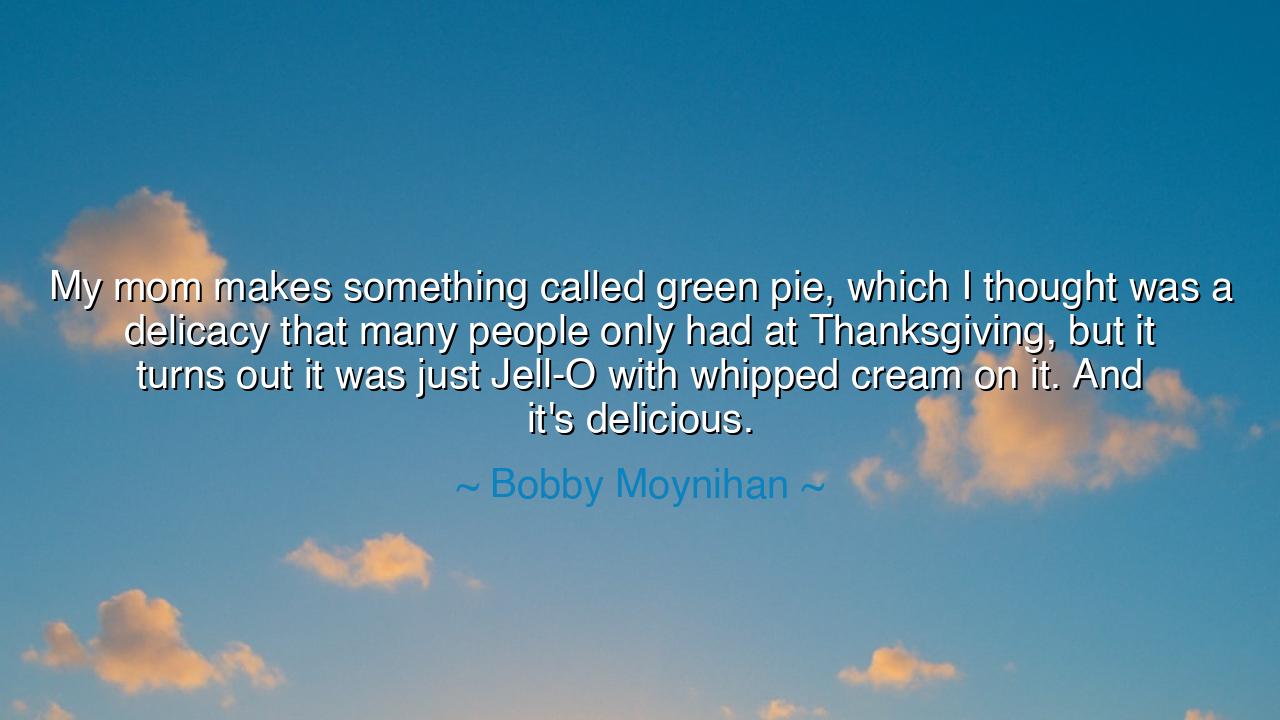
My mom makes something called green pie, which I thought was a
My mom makes something called green pie, which I thought was a delicacy that many people only had at Thanksgiving, but it turns out it was just Jell-O with whipped cream on it. And it's delicious.






"My mom makes something called green pie, which I thought was a delicacy that many people only had at Thanksgiving, but it turns out it was just Jell-O with whipped cream on it. And it's delicious." In this tender remembrance, Bobby Moynihan speaks to the heart of family traditions and the way in which simple things, when wrapped in love, become treasures. The dish itself—no more than Jell-O with whipped cream—might seem ordinary, but to the child who receives it from his mother’s hands, it is transformed into a delicacy, sacred and rare. His words remind us that it is not always the grandeur of the feast that makes Thanksgiving holy, but the humble offerings that carry memory, love, and belonging.
The origin of this truth lies in the mystery of childhood perception. For children, what is served at the family table is not just food—it is identity, ritual, and wonder. Moynihan believed his mother’s green pie was rare, even universal, something every family surely must have savored at Thanksgiving. Only later did he discover that it was unique to his own household, born not of ancient recipes or culinary fame, but of creativity, resourcefulness, and a mother’s love. And yet, that uniqueness is what gave it its true value—it was not everyone’s, it was his family’s.
History offers many parallels. Consider the story of immigrant families who arrived in America with little, often too poor to replicate traditional feasts from their homeland. They made do with what they had—simple ingredients, inexpensive substitutes. And yet, over time, these humble creations became beloved family staples, passed down with reverence. A dish of beans, a loaf of bread, or a makeshift pie became the centerpiece of memory, imbued with meaning far greater than its ingredients. Just as Moynihan’s green pie became his delicacy, so too did these modest foods become treasures because they carried the flavor of love and perseverance.
There is also a symbolic truth here about gratitude and simplicity. How often do we chase the extraordinary, believing joy lies only in abundance, luxury, or rarity? Moynihan’s words turn this upside down: joy is found in the ordinary, when seen through the lens of love. The world may laugh at Jell-O with whipped cream, but to him it was no less than a feast for the soul. And is this not the essence of Thanksgiving? To see the simple—family, food, breath itself—and to call it delicious.
This lesson also teaches us the power of tradition. A dish may be humble, even humorous to outsiders, but within the family it becomes sacred. The repetition year after year transforms it into a ritual, a symbol of continuity across generations. To abandon it would be to lose a piece of the family’s heart. Thus, Moynihan’s story is a reminder to cherish even the quirks of our family tables, for these are the things that bind us to our past and carry us forward into the future.
The lesson for future generations is this: do not despise what seems small. The simplest dish, the plainest tradition, may one day be remembered as the sweetest part of your life. Teach children to see not only the food but the hands that made it, not only the recipe but the love that seasoned it. What is ordinary in the eyes of the world may be extraordinary in the eyes of the heart.
Practical action flows from this wisdom. At your own feast, do not measure the value of a dish by its elegance or cost, but by the joy it brings to those you love. Keep alive the odd traditions—be it green pie, a strange casserole, or a family joke—because these become the living memory of your lineage. When you gather, tell the stories of these foods, so that children know they are part of something larger than themselves. In this way, the feast becomes not only nourishment for the body but an inheritance for the soul.
Thus, Moynihan’s words, though playful, resound with deep truth: love transforms the ordinary into the extraordinary. A humble dish, touched by memory and tradition, becomes a delicacy sweeter than any banquet. And this is the essence of Thanksgiving—that the smallest things, offered in love, fill us with the greatest joy.






AAdministratorAdministrator
Welcome, honored guests. Please leave a comment, we will respond soon